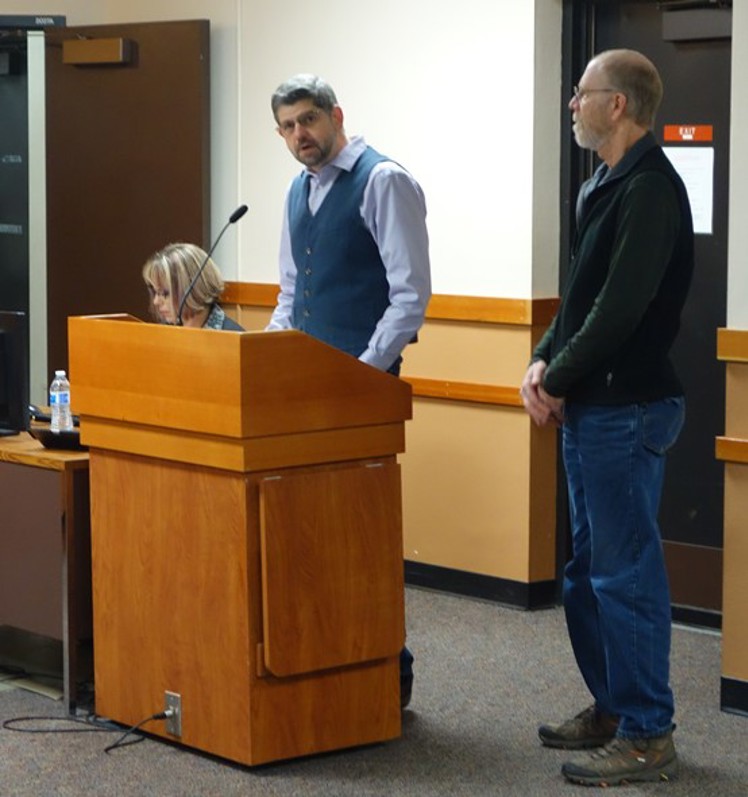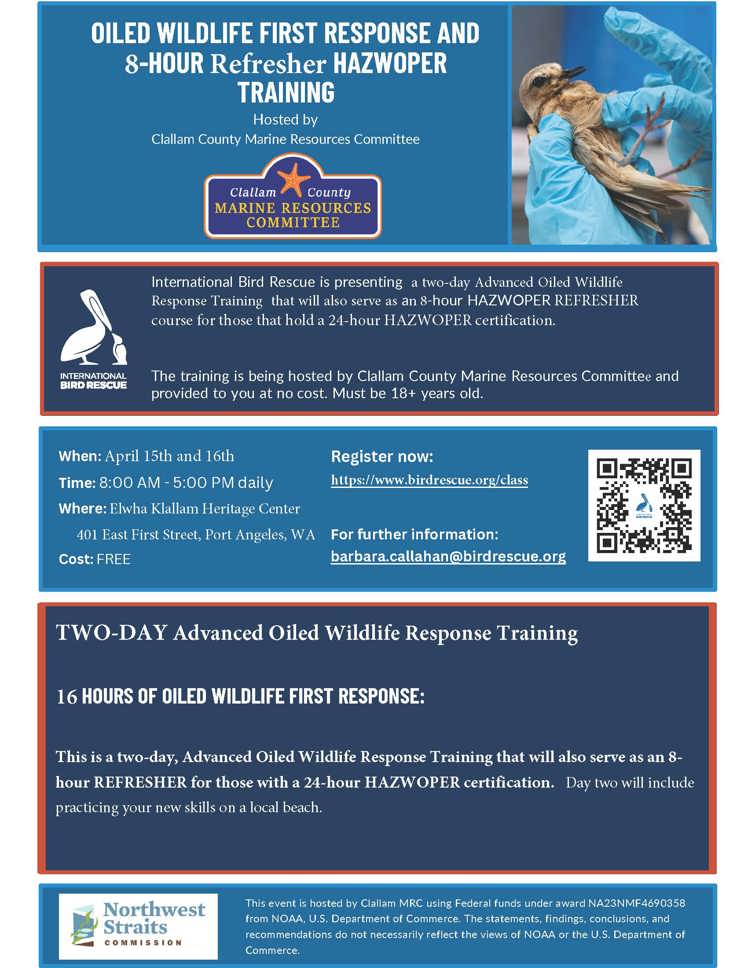International Bird Rescue is presenting a two-day Advanced Oiled Wildlife Response Training that will also serve as an 8-hour HAZWOPER refresher course for those that hold a 24-hour HAZWOPER certification.
The training is being hosted by Clallam County Marine Resources Committee and provided to you at no cost. Must be 18+ years old.
When: April 15th and 16th, 2025
Time: 8am - 5pm daily
Where: Elwha Klallam Heritage Center, 401 East First St, Port Angeles, WA
Cost: FREE
Register now: https://www.birdrescue.org/class
Register Here
Oil spills are a hazard to marine life and their habitat. Between 2010 and 2025, in support of planning and responding to oil spills, Clallam MRC has offered two types of training annually to provide community members with the skills needed to respond to an oil spill. The Hazardous Waste Operations and Emergency Response (HAZWOPER) training provides basic training in who is involved in oil spill response, precautions required for those responding to a spill, and the current state of spill response preparedness. Oiled wildlife rescue training provides an opportunity to learn the skills needed to search for, capture, and rehabilitate oiled birds and other wildlife.
FEBRUARY 2024 - HAZWOPER AND OILED WILDLIFE TRAINING
The Clallam MRC, in collaboration with the Jamestown S’Klallam Tribe, organized a 24 hour HAZWOPER/Oiled Wildlife training event at Red Cedar Hall in Sequim.
HAZWOPER - Hazardous Waste Operations and Emergency Response - is a nationally recognized certification program designed to give participants the skills to respond to hazardous waste crises, including oil spills.
This February's event drew participants from five tribes, including those as far as Quinault.
The training resulted in 29 certified individuals on the Olympic Peninsula and marks significant strides towards building community capacity for responding to oil spills.
Photo credit Rebecca Mahan

MARCH 2019 - OIL SPILL PREPAREDNESS MONTH
During their regular meeting on February 26, the Clallam County Commissioners issued a proclamation to designate March 2019 as Oil Spill Preparedness Month.
Clallam MRC and its partners invited the public to participate in several trainings and outreach events in the county to promote awareness of the importance of oil spill preparedness.
- On March 2nd Clallam MRC hosted an 8-hr HAZWOPER training provided by Washington Department of Fish & Wildlife, US Coast Guard, Department of Ecology and Focus Wildlife.
- On March 21-23 the Jamestown S’Klallam Tribe hosted a 24-hr HAZWOPER training at Guy Cole Center in Sequim. The training was open to all.
- On April 27th the Clallam MRC and Focus Wildlife offered an oiled wildlife training.
In 2018 as part of the Oil Spill Preparedness month Clallam MRC and Department of Ecology hosted a webinar about on improvements and challenges Washington's oil spill program faces. The webinar is now posted on Ecology's website.

Jeff Ward, MRC Chair, gives the acceptance speech
2010 - 2019 HAZWOPER Training
Once a year Clallam MRC along with Washington Department of Fish & Wildlife, the U.S. Coast Guard, Focus Wildlife and Washington Department of Ecology hosted a HAZWOPER training in Port Angeles.
The one-day training covered how to recognize, react, and protect yourself from the hazards associated with an oil spill. The class provided information on hazardous situation recognition, personal protective equipment, decontamination procedures, and an overview of how oil spill response operations are conducted. Several videos were shown to demonstrate the different topics including a very amusing video about spread of contamination by a person. The class also examined hazards associated with working around oiled wildlife, however, it should be noted that while some of the subject matter discussed is related to oiled wildlife specific hazards, this training was not a wild-life handling or treatment course.

Volunteers try out personal protective equipment

Commissioner Mark Ozias welcomes the volunteers
Upon completion, the participants received an 8-hour Hazardous Waste Operations and Emergency Response certificate. An annual renewal of the certificate is a requirement for being able to work in the field during an oil spill. Between 2010 and 2019 more than 590 volunteers received the annual required HAZWOPER certificate through this program.
2010 - 2019 Oiled Wildlife Training
For many years Clallam MRC and Island Oil Spill Association partnered to host two oiled wildlife trainings at the Clallam Fairgrounds. The first of the two trainings focused on Basic Intake and Stabilization. The participants learned basic bird anatomy and how to take care of oiled birds. The training included working with live ducks learning how to hold, weigh, and give them fluids and how to perform a general health examination. The participants also had the opportunity to examine several different species of dead frozen birds.
The second oiled wildlife training focused on Search and Capture. The participants learned about search & collection procedures including stalking and netting birds and how to perform an initial “beak-to-tail” examination and safely handle birds. The last part of the training was conducted in the field at Ediz Hook where the participants practiced search and capture techniques.
In 2019 Clallam MRC partnered with Focus Wildlife to host one oiled wildlife training at the Pioneer Park in Sequim. The 8-hr training focused on wildlife behavior, handling and initial care. The participants had the opportunity to examine several dead birds and give them fluids. The trainer also performed an autopsy to give the participants a better understanding of bird anatomy.
Between 2010 and 2019 more than 400 volunteers have received initial care training of oiled wildlife.




